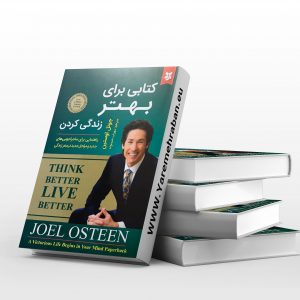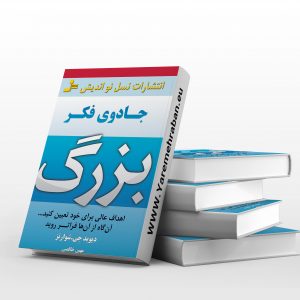Description
Existential psychotherapy is both a guide for therapists and a form of therapy: anyone who reads it is deeply moved and becomes wiser, as if sitting for hours with someone who is determined. Is determined to overcome the deepest human problems. Dostoevsky, Tolstoy, Kafka, Sartre, Camus, and many others have joined forces with the author to speak of the ultimate concerns of mankind.
The main audience of the book is students and clinical therapists, but because of its understandable style and devoid of specialized terms, it is also understandable and very attractive to the average reader. After writing this book and to develop existential theory, Yalom turned to the tools of the story and created works such as When Nietzsche Wept and Mom and the Meaning of Life. He considered existential psychotherapy itself as the reference book of all the works he has written since then.
Have you ever had your fears and motivations conflicting? Or does the conflict between your conscious and the unconscious confuse you? How do you define existence, death and freedom? Have you found the right answers to your questions about the existence of the universe? Such questions have all been answered in Erwin Yalom’s masterpiece, Existential Psychotherapy. Erwin Yalom is the author of the famous book When Nietzsche Wept. Existential psychotherapy gives you the chance to spend a few hours with good psychotherapy without spending money and time and improve your mental state.

About the author
«Erwin d. Irvin D. Yalom is an American psychotherapist, university professor, and author who is now 89 years old. Yalom entered Stanford University as a professor after graduating and serving in the military. At the same time, he developed the existentialist approach. Yalom was very successful in psychotherapy and in 2002 won the American Psychiatric Association (APA) Award. Her husband, Marilyn Koenick, was an American historian and feminist writer who died in 2019.
Ervin Yalom publishes his professional and personal life on his website for his fans. In addition to the book Existential Psychotherapy, some of Ervin Yalom’s works are:
Every day closer than before;
The Executioner of Love and Other Psychotherapy Stories;
When Nietzsche wept;
Lying on the sofa;
Mom and the meaning of life;
Schopenhauer treatment;
I inform the police;
Spinoza’s problem;
The art of healing.
About the book Existential Psychotherapy by Ervin Yalom
Yalom has chosen the title of the book Existential Psychotherapy to tell the audience in a few simple words what he is going to talk about. Existential psychotherapy is a different kind of dealing with people’s mental ambiguities. The author of this book tries to teach you the treatment of mental wounds caused by existential problems. This style of psychotherapy was also used before writing this book; But with the publication of this book, he became better known.
This book quickly became popular. Many people found the answer to their ambiguities: those who were a little confused by questions about the philosophy of life. Eventually, this confusion led to these people suffering from mental illness. They found the answers to their questions about the four principles of death, freedom, loneliness and emptiness in this book. More interestingly, some people with problems did not even know what their lack was due to; But by reading this book, in addition to finding those ambiguities, they also got the right answer.
“It’s a masterful and innovative work,” Goodreads readers have said of the book. Erwin Yalom himself has given a simple explanation of the whole book, thinking about which can help the audience to understand the book better. He says:
Existential psychotherapy is a type of dynamic or dynamic psychotherapy. Dynamic is a term that is often used in the field of mental health as “psychopsychology”.
The main part of the success of this book is due to the simple and clear expression of the main ambiguities of life. In addition, the philosophical expression of psychological concepts also plays an important role in the success of this book. Yalom articulated concepts in the language of philosophy that such greats as Freud, Dostoevsky, Tolstoy, Kafka, Sartre, and Camus explored in different ways. Existential psychotherapy could be introduced as the most complete collection in this field and make the audience needless to refer to similar books and even the therapist.
In his book, Yalom describes the details of life very artistically. For example, he describes existential healing agents as follows:
Understand that sometimes life is unfair and oppressive;
Understand that, in the end, one cannot escape some of the sufferings of life and death;
Understand that no matter how close I get to others, I still have to face life alone;
Realizing that no matter how much I am guided and supported by others, it is ultimately the responsibility of my lifestyle.
In this book, the author uses stories, famous plays, biographies of prominent people in history, as well as self-disclosure of his personal life to communicate properly with the audience. This style reflects Yalom’s comprehensive knowledge of the subjects of dramatic literature, philosophy, and psychology.
The structure of the book Existential Psychotherapy
Existential Psychotherapy is written in four separate sections. Death, freedom, loneliness and emptiness are the four principles on which the author wrote the book. In each of these sections, the audience becomes familiar with the meaning of one of the above principles. For more information, we will have an overview of the topics in this book:
Gratitude
Chapter One: Introduction
Existential therapy: dynamic or dynamic psychotherapy;
Existential orientation: strange but strangely familiar;
Existential psychotherapy;
Existential therapy and the academic community.
Part One: Death
Chapter Two: Life, Death and Anxiety
The two-way relationship between life and death;
Death and anxiety;
Neglect of death in theoretical and applied psychotherapy;
Freud: Anxiety without death.
Chapter 3: The Concept of Death for Children
The prevalence of death anxiety in children;
The concept of death: evolutionary stages;
Death anxiety and the formation of mental disorders;
Teaching children about death.
Chapter 4: Death and Mental Illness
Death anxiety: a pattern of mental disorders;
Exception;
The ultimate savior;
Towards an integrated perspective on mental disorders;
Schizophrenia and fear of death;
Existential pattern of mental disorders: Research evidence.
Chapter Five: Death and Psychotherapy
Death is like a borderline situation;
Death as the main source of anxiety;
Psychotherapy problems;
Life Satisfaction and Death Anxiety: A Safe Footprint for Treatment;
Desensitization of death;
Part II: Freedom
Chapter Six: Responsibility
Responsibility is like an existential concern;
Evasion of responsibility: clinical manifestations;
Responsibility and psychotherapy;
Awareness of American-style responsibility or how you take responsibility for your life, take control of your actions, watch out for number one, and achieve it;
Responsibility and Psychotherapy: Research Evidence;
Limitations of liability;
Existential responsibility and guilt.
Chapter 7: Wanting
Responsibility, desire and action;
Towards a clinical understanding of the will: Rank, Farber, May;
Will and clinical work;
Wish;
Decision-selection;
The past versus the future in psychotherapy.
Part III: Alone
Chapter 8: Existential loneliness
What is existential loneliness?
Loneliness and communication;
Existential loneliness and interpersonal mental disorders.
Chapter 9: Existential loneliness and psychotherapy
Tips for understanding interpersonal relationships;
Facing the patient alone;
Loneliness and patient-therapist confrontation.
Part IV: Absurdity
Chapter Ten: Absurdity
Problem of meaning;
The meaning of life;
Lack of meaning: clinical consequences;
Clinical research.
Chapter Eleven: Absurdity and Psychotherapy
Why do we need meaning?
Psychotherapy measures.
notes;
Profile.
Is this book right for you?
Existential Psychotherapy is a specialized book in the field of psychology; Therefore, reading it is recommended for students of psychology, psychotherapy, professors, psychotherapists and psychologists. Of course, due to the simple language and away from specialized terms, many people have suggested reading this book to the general public. Most ordinary readers of this book are also satisfied with their choice. So if you also like to make time for your inner psychoanalysis, you can read this book. Reading this book is like spending a few hours with an experienced psychotherapist that can really improve your mood.
Excerpts from Existential Psychotherapy
The reality of death is involved in psychotherapy in two very different ways: first, death consciousness acts as a “borderline situation” and brings about a fundamental change in the outlook on life; Another is that death is the main source of anxiety.
***
Avoidance of responsibility is the main obstacle to the psychotherapy of a person with mental illness. Responsibility in these patients has shifted twice; The suffering they suffer is more physical than psychological. Even when they realize that their physical problem has a psychological basis, they still use extrinsic defenses to attribute their psychological boredom to weak nerves or poor work and environmental conditions.
***
Because decision-making is so difficult and painful for some people, it is unlikely that one will look for ways to avoid making decisions. The most obvious method is procrastination, and every therapist has patients who walk anxiously and hesitantly in front of the gate of decision.
***
The harmony with the synchronicity of the movement, if it is perfect, fascinates, excites and fascinates every spectator; In the meantime, it does not matter if the performance of each dancer alone was satisfying and enjoyable.
***
Cosmic meaning means the existence of a plan outside and above the individual, and why and why does it refer to a magical or spiritual order in the world.
***
According to the theory of logotherapy (meaning therapy), the quest to find meaning in life is the most important motivational force in human beings.
1- Introducing the book Existential psychotherapy on YouTube
2- Introducing the book Existential psychotherapy in Aparat














Reviews
There are no reviews yet.